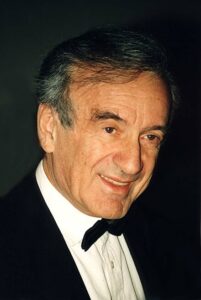By Rabbi Dr. Israel Drazin


PIKESVILLE, Maryland — Eli Wiesel was an excellent writer. His novel The Testament is brilliant. Everything about it is fantastic. The plot is interesting, enlightening, and engaging, a delight to read. He won the Nobel Peace Prize in 1986 because of what he wrote about the horrors of the Holocaust, Russia, and other subjects.
He paints his characters in words artistically, as Rembrandt painted in oils. His Nobel citation reads: “Wiesel is a messenger to mankind. His message is one of peace and atonement and human dignity. The message is in the form of a testimony, repeated and deepened through the works of a great author.”
He certainly deserved this Nobel Peace Prize. I feel that he should have also won the Nobel Prize for literature because his books are so good.
The Testament is a novel focusing on the Soviet leader Stalin murdering Russia’s greatest Jewish poets and novelists on August 12, 1952, and before that date. Wiesel gathers the lives, thinking, and acts of these martyrs by imagining the tale of Paltiel Kossova , a Jewish poet who, despite devoting himself to communism, was murdered by the communist leader. Readers will wonder why the Jewish intellectuals were killed. They will gain many insights from this book about Jews and non-Jews.
Readers will enjoy Weisel’s manner of writing. While undoubtedly easy-to-read prose, his writing often feels poetic, even dream-like, like good poetry usually saying more than what the words are saying. His writings prompt us to think.
We read about the poet’s upbringing. He was raised in a Jewish Orthodox Russian home, studied with rabbis, observed all the Jewish rituals, and put on his tefillin daily when he recited prayers, except on Shabbat and holidays, as Jewish laws require. But he soon abandoned Jewish practices for communism, as I will discuss below. Even during the many years of abandonment, he always took his tefillin in his suitcase when he traveled or placed it in his drawer at home, unable to abandon his father’s life completely.
Is this why Stalin hated Jews who loved, glorified, and aided communism because he could not stand the idea that their communism contained a Jewish seasoning?
We read about the pogroms the poet and his family experienced, the murders, the vicious manner in which non-Jewish mobs treated Jews on the holiday of Christmas, the rapes, mutilations, robberies, destruction of homes, and other repulsive acts that Wiesel depicts artistically.
Similarly, we read how our poet went to war in Spain on the side of communism when Spain was involved in a civil war between those who adopted Nazi ideas and those who endorsed communism. Each side committed inhuman cruelties. The same occurred when he joined the Russian army against Germany, with the same atrocities, deaths, and mutilations.
What struck me the most of all the many revelations Elie Wiesel gives us is the ease with which religious Jews turned from the wisdom and goal of Judaism to communism. The psychology is evident today, both among Jews and non-Jews.
The Jewish youths in Stalin’s Russia, both those who were mistreated and those who lived in prosperity, those with Jewish education and those who had little Jewish knowledge, were filled with the desire to see a messianic age, which Judaism saw as a goal for humanity. They felt correctly that the age would not come miraculously. It required work. But they stumbled in the wrong direction when they listened and believed that communism would create their desired messianic age. They naively believed communism would create equality, luxury, and freedom – the sun would shine brighter, the air would be fresher, and the water clearer.
This problem exists for all people today, not only Jews. People need goals to survive, but the goals must be sensible. Even if the goals are ideal, people must be careful what path they take to accomplish them.
Communism is not seen as a path to the Valhalla today, but a diluted version of it, socialism, is. Jewish intellectuals were murdered by Stalin in 1952 under the banner of communism; all society will suffer and drown in its watered-down version.
*
Rabbi Dr. Israel Drazin is a retired brigadier general in the U.S. Army Chaplain Corps and the author of more than 50 books.